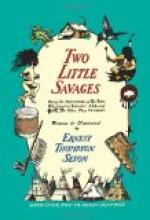An Indian jailed for theft bore bravely through the winter, but when the springtime brought the Gander-clang in the black night sky, he started, fell, and had gone to his last, long, hunting home.
Who can tell why Jericho should fall at the trumpet blast?
Who can read or measure the power of the Honker-song?
Oh, what a song the Wild Geese sang that year! And yet, was it a new song? No, the old, old song, but Yan heard it with new ears. He was learning to read its message. He wandered on their trailless track, as often as he could, northward, ever northward, up the river from the town, and up, seeking the loneliest ways and days. The river turned to the east, but a small stream ran into it from the north: up that Yan went through thickening woods and walls that neared each other, on and up until the walls closed to a crack, then widened out into a little dale that was still full of original forest trees. Hemlock, Pine, Birch and Elm of the largest size abounded and spread over the clear brook a continuous shade. Fox vines trailed in the open places, the rarest wild-flowers flourished, Red-squirrels chattered from the trees. In the mud along the brook-side were tracks of Coon and Mink and other strange fourfoots. And in the trees overhead, the Veery, the Hermit-thrush, or even a Woodthrush sang his sweetly solemn strain, in that golden twilight of the midday forest. Yan did not know them all by name as yet, but he felt their vague charm and mystery. It seemed such a far and lonely place, so unspoiled by man, that Yan persuaded himself that surely he was the first human being to stand there, that it was his by right of discovery, and so he claimed it and named it after its discoverer—Glenyan.
This place became the central thought in his life. He went there at all opportunities, but never dared to tell any one of his discovery. He longed for a confidant sometimes, he hankered to meet the stranger and take him there, and still he feared that the secret would get out. This was his little kingdom; the Wild Geese had brought him here, as the Seagulls had brought Columbus to a new world—where he could lead, for brief spells, the woodland life that was his ideal. He was tender enough to weep over the downfall of a lot of fine Elm trees in town, when their field was sold for building purposes, and he used to suffer a sort of hungry regret when old settlers told how plentiful the Deer used to be. But now he had a relief from these sorrows, for surely there was one place where the great trees should stand and grow as in the bright bygone; where the Coon, the Mink and the Partridge should live and flourish forever. No, indeed, no one else should know of it, for if the secret got out, at least hosts of visitors would come and Glenyan be defiled. No, better that the secret should “die with him,” he said. What that meant he did not really know, but he had read the phrase somewhere and he liked the sound of it. Possibly he would reveal it on his deathbed.




